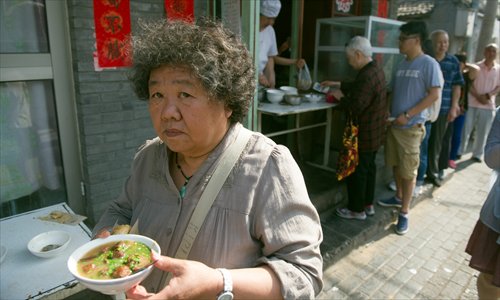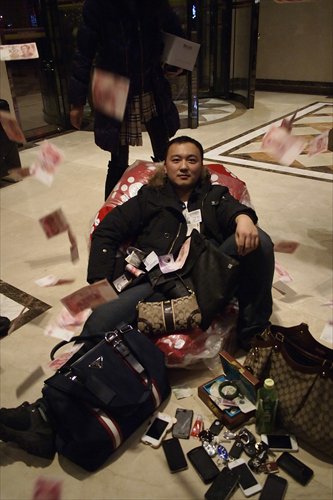Lost in translation
What will be the next Chinese loanword to catch on in English?

Inclusion in prominent English dictionaries is seen by some as the first step for loanwords entering mainstream discourse. Photo: IC
Yannick Pelletier, 28, is currently fascinated by the Chinese expression yeshi zuile, a phrase that has recently become popular on the Internet, and literally means, "I'm also drunk."
"It's used when you're shocked or speechless," said Pelletier, an English teacher in New York who started learning Chinese two years ago, and who met his Chinese wife in Beijing. "I find it interesting since its word-by-word translation is not so close to its meaning. It might just be personal, but when I'm drunk, nothing can shock me and I talk a lot more than usual."
As China's cultural influence grows, more and more Chinese loanwords have come into common usage in English - from long-existing nouns like "kung fu" and "tofu," to the use of words expressing more abstract concepts like guanxi ("connections") and guanggun (literally "bare branches," used to describe bachelors). In recent years, words like tuhao ("the crass new rich") and dama ("elderly Chinese woman") have even been shortlisted for inclusion in The Oxford English Dictionary. "Chinese buzzwords often come to our attention through media," Julie Kleeman, project manager of Bilingual Dictionaries with the Oxford University Press, told Xinhua News Agency in November 2013. "In the case of Chinese words that are gaining publicity in foreign media, obviously some terms such as tuhao and dama tell us something about trends and phenomena in China that mark interesting shifts in society."
Common Chinese words in English
Pelletier runs a Facebook blog called "Learn Chinese with a laowai," on which he often shares new Chinese meme words and other Chinese phrases he finds interesting with fellow language learners.
Although he has a personal fascination with Chinese Internet memes, Pelletier was skeptical about whether they would catch on in English outside of China.
"If we look at the Chinese words actually used in English, they are not expressions or slang [words]," said Pelletier. "They are used because we don't have any English words to express [certain common] objects from China."
Pelletier listed litchi, oolong tea, dim sum, tofu, mahjong, feng shui and tai chi as examples - all of which can be found in The Oxford English Dictionary.
Both specialist terms and basic nouns of Chinese origin are included in the dictionary, such as wu wei (under the entry for Taoism, meaning "nonaction, or letting things take their natural course"), pipa ("a shallow-bodied, four-stringed Chinese lute"), chow mein ("A Chinese-style dish of fried noodles") and kowtow (to "act in an excessively subservient manner").
Linguist Zhao Ronghui said that it was natural that more Chinese words were being adopted in English as the international community pays more attention to social trends and changes in China.
Zhao works for the Institute of Linguistics at Shanghai International Studies University, which is also Research Center for Foreign Language Strategies under State Language Commission.




As Chinese cultural sway around the world grows, more loanwords are finding their way into the English language. Photos: Li Hao/GT
Don't be such a diaosi
Zhao said that there were two recent Chinese expressions that were strong candidates for coming into common usage among particular professional sectors of the English-speaking population.
The first is xin changtai - a phrase used by President Xi Jinping to describe the slower pace of economic growth in China as the "new normal." The second is yidai yilu ("One Belt, One Road") - a term also first unveiled by Xi, referring to an organizational framework for closer economic ties between China and the rest of the world.
As for linguistic expressions mainly popularized on the Internet in China, such as diaosi ("loser") and xiao xianrou (literally "little fresh meat," referring to a handsome, innocent-looking young man), Zhao was unsure about their likelihood of catching on, despite the inclusion of some such phrases on American online dictionary for slang, Urban Dictionary.
"The group of people using these words is limited to mostly younger generations who use them online," said Zhao. "Young people are creative in their language use. They challenge and play with [language conventions]. But they do not necessarily affect mainstream discourse."
Zhao said that unless a linguistic meme that originated on the Internet was published in a national newspaper like the People's Daily, it would be unlikely to enter the national consciousness.
Among the Chinese words that have been discussed in the Chinese media to be highly possible as having a strong possibility of being included in English dictionaries, are jiayou (a term used to cheer somebody on) and chengguan (urban management officers). But Hugo T. Y. Tseng, chairperson of the English department at Soochow University in Taipei, Taiwan, is less optimistic.
"Tuhao and dama haven't made any headway in the English-speaking world - they are terms that are talked about [by English speakers], rather than actually used," said Tseng. "It's like the word pneumonoultramicroscopicsilicovolcanoconiosis [a lung disease caused by silica dust], which is usually considered the longest word in English. It is often discussed and analyzed. Rarely, if ever, is it actually used in conversation."
Whether Chinese words are actually adopted in English outside of academic or specialized circles, said Tseng, is dependent upon whether they resonate with English-speakers.
"Unless the English-speaking world considers these words to be universal and capable of transcending cultural barriers, or unless they are unique enough to attract interest, they'll end up like the [previously popular] word geili ['able to excite']," said Tseng. "[It was] transposed into English as "gelivable," which [Chinese people] just did for fun and to feel self-satisfied."
Criteria for a successful loanword
"The [Chinese] words that have actually entered the English language are usually unobtrusive," said Tseng. The latest of these, he said, is "Buddha's hand" ("foshougan") referring to a kind of fruit with segmented finger-like sections.
Two other recent examples, he added, are goji (a bright red berry commonly found in China) and wuxia (a genre of fiction that tells the stories of martial artists in ancient China). Both were added to The Oxford English Dictionary in 2010.
Tseng's opinions are in line with the conclusions of professor Allan Metcalf, executive secretary of the American Dialect Society, in Predicting New Words: The Secrets of Their Success (2002). In the book, Metcalf explores why some new words find favor, while others are ignored.
Whether a word endures, Metcalf concludes, is dependent on factors including its frequency of use, its unobtrusiveness (whether a word is normal-sounding enough to become a comfortable part of speech), and whether it generates new forms and the concept to which it refers persists through time.
Speaking specifically about loanwords across languages, Zhao said that a prerequisite was that the word being loaned did not already exist in the target language.
"If there are corresponding words, loanwords won't happen," said Zhao. Therefore, said Zhao, words that refers to distinctive features of a country, such as names, cultural elements and cultural phenomenon, are more likely to become loanwords. Loanwords that can be adapted in the word formation rules of the target language are also more likely to catch on, said Zhao.
Tseng said the prevalence of loanwords in other languages was ultimately dependent on the political, cultural and military clout of the nation loaning the word.
"[As China's national strength grows,] having Chinese words in the English language will be completely normal. If it happens, we'll become accustomed to it and it will no longer surprise us."
Risks of mistranslation
Pelletier said he considered some words to be completely untranslatable from Chinese to English, such as shanghuo ("rising inner heat") and zhaoliang ("catching inner cold"). Both terms refer to common concepts in traditional Chinese medicine.
"The concept of [inner] heat and [inner] coldness doesn't exist in Canada or the US," said Pelletier, who was born in Quebec. He said despite his wife's best efforts, he struggled to grasp the concepts, and that trying to import them into English might obscure their original meaning.
Pelletier is not alone in fearing that the wholesale import of Chinese words into English might confuse English-language speakers, leading to a distorted impression of what certain words and concepts actually mean, and consequently to a false understanding of Chinese culture.
Last December, the"Key concepts in Chinese Thought and Culture - Translation and Communication Project" launched by the State Council released the first batch of 81 words in English. The project is designed to more accurately define China's key cultural concepts for the rest of the world.
Zhao gave the example of long, commonly translated as dragon, as a word that might give the wrong impression when translated from Chinese to English. She pointed out that the word "dragon" usually has negative connotations in English, being associated with evil, where as in Chinese culture, long is usually a symbol of good fortune. This was why translation projects like the one were important, she said.
Tseng said the more prominent the differences between cultures, the more likely there would be unique words whose meanings would be lost in translation.
"The examples that I can immediately think of are dongshi [literally to "understand matters," but usually used to talk about whether a child is obedient or dutiful] and qingxiu [an adjective describing a woman's figure as being "delicate]" said Tseng. "Both words have corresponding English definitions in a dictionary, but these definitions do not perfectly encapsulate their meanings in Chinese."